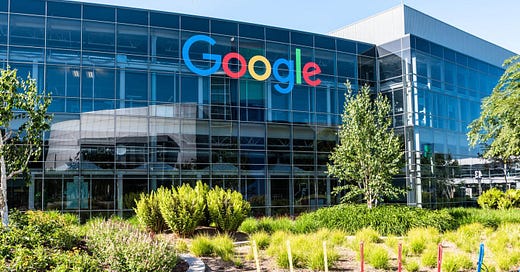What Makes Alphabet So Special
Because Alphabet and Facebook are such a large part of my portfolio at around ~55%, I’ve been asked to share my thoughts on each in long-form format and without the constraints of Twitter threads. I’ll try to explain as best as I can what makes them so special to me, and why I likely won’t sell either anytime soon, starting with Alphabet today.
Alphabet: An embarrassment of riches
Alphabet is a holding company, of which Google is one part — and this includes Google Search, YouTube, Android, Play, Maps, Gmail, GCP (Google Cloud Platform), Ads, Pixel & hardware, and more. Alphabet also owns Waymo, an autonomous driving business, as well as Verily, CapitalG, and basically all of their other moonshots / other bets.
When you evaluate Alphabet as an investment, it’s important to know a few things. First, Alphabet is primarily a digital ad business, which accounts for a large majority of their total revenue. This ads business includes Search, Network Partners, and YouTube. There are several reasons why this Ads business continues to grow year over year.
First, Alphabet owns Android which accounts for 85% of mobile market share and Chrome browser which accounts for 70% of the desktop browser market share, both of which Google is the default search engine for. This distribution of their search product, as well as the resulting monetization of it, allows Google to pay Apple (the remaining 15% of the mobile market share) to make Google the default search for iPhones. As a result, Google has been able to achieve and maintain 90% market share of their search product for years.
This is important because on one side, it allows Google to aggregate demand and on the other side, advertisers want to be able to access the most possible consumers at once. That alone allows Google to have a wide moat, but the word “wide” doesn’t even begin to do Google’s moat justice.
Because there is intent behind each Google query, it turns out that Google’s ROI is the highest of any current form advertisement. On top of that Google offers advertisers additional ways to target specific queries, locations, device types, and on and on. It is a remarkably effective form of advertising and it is based on a real-time auction; it turns out that costs per click end up being right where they should be to keep businesses profitable. Because the ROI is so high, this is the last form of advertising that will be cut during a recession.
On top of that, any small 1 or 2 person business can easily set up a Google Ads campaign and get started right away, whereas before Google you’d likely have to choose between a local newspaper with limited circulation, magazine, radio, or TV, which for most small businesses was costly and out of the question. So when you look at market size, you need to understand that while Google is taking share from traditional advertising, it is also making the total advertising pie larger.
So why can’t Bing, Twitter, Snap, or even Facebook take share? Well, a few reasons. First, when you have a high ROI form of advertising, you want to maximize it and put as many dollars towards it as you can — you commit to the platform. Even if some other ad company were to come along, you would not split your budget. Maybe you would add to your total ad spend, but you would not subtract from your Google ad spend. Secondly, although anyone can start Google Ad campaigns, it does take continued commitment, time, and effort to get it right. It’s a tough sell trying to convince a business so focused on Google Ads to commit the same energy towards another platform when they know that everyone on that other platform is using Google for search anyway. Digital Ads really is a winner take all market, and as a result Google and even Facebook will continue to have a very large part of this (still growing) market.
The Next Leg of Growth
YouTube is part of their advertising business and is still growing around 35%, though gross margins are lower than Search because of the revenue split with creators. Local ads and Maps is still in infancy and could add to revenue growth in the mid-term.
Google Cloud Platform is a small part of their revenue but growing over 50% a year at an over $10 billion run rate. This includes their platform as a service, as well as their SAAS business which includes G Suite. Given the size of cloud, this probably will be a huge business in time.
The jury is still out on their hardware business which includes Pixel phones, Pixel buds, and hardware for the home including Nest. I would not count them out longer term given Alphabet’s investments in ambient computing and AI, and their intent to weave these technologies into their hardware lineup.
Longer term, Alphabet has set itself up nicely with some key investments, including Artificial Intelligence, Machine Learning, Autonomous Driving, Healthcare, and so much more.
I really believe that Alphabet is in one of the areas that is essentially market-size un-constrained, as Jeff Bezos likes to say.
At best, the market seems to completely dismiss Alphabet’s long-term bets, and at worst it holds it against them. Amazon on the other hand gets praise for thinking decades ahead and the market has always rewarded them with an extra generous valuation.
Given that Alphabet recently appointed Sundar Pichai as the new CEO, I really do believe we are close to an inflection point where the market will (1) start to give Alphabet their due credit for the embarrassment of riches in its portfolio and (2) start to appreciate their long-term thinking.




